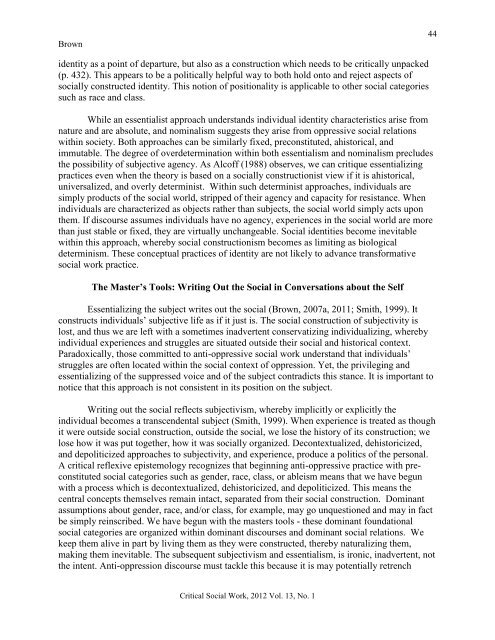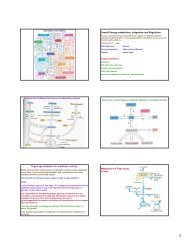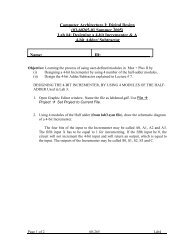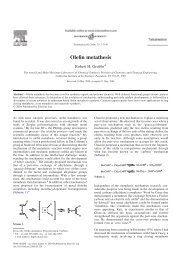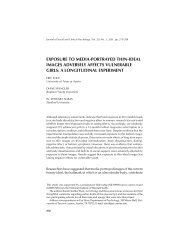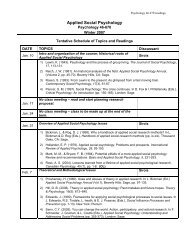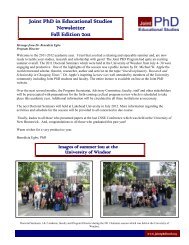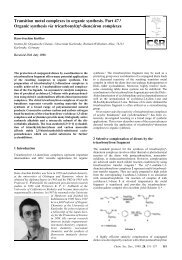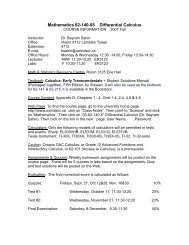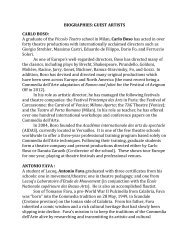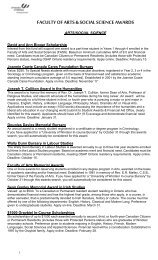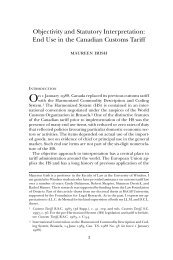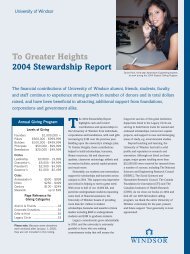Critical Social Work - University of Windsor
Critical Social Work - University of Windsor
Critical Social Work - University of Windsor
Create successful ePaper yourself
Turn your PDF publications into a flip-book with our unique Google optimized e-Paper software.
Brown<br />
identity as a point <strong>of</strong> departure, but also as a construction which needs to be critically unpacked<br />
(p. 432). This appears to be a politically helpful way to both hold onto and reject aspects <strong>of</strong><br />
socially constructed identity. This notion <strong>of</strong> positionality is applicable to other social categories<br />
such as race and class.<br />
While an essentialist approach understands individual identity characteristics arise from<br />
nature and are absolute, and nominalism suggests they arise from oppressive social relations<br />
within society. Both approaches can be similarly fixed, preconstituted, ahistorical, and<br />
immutable. The degree <strong>of</strong> overdetermination within both essentialism and nominalism precludes<br />
the possibility <strong>of</strong> subjective agency. As Alc<strong>of</strong>f (1988) observes, we can critique essentializing<br />
practices even when the theory is based on a socially constructionist view if it is ahistorical,<br />
universalized, and overly determinist. Within such determinist approaches, individuals are<br />
simply products <strong>of</strong> the social world, stripped <strong>of</strong> their agency and capacity for resistance. When<br />
individuals are characterized as objects rather than subjects, the social world simply acts upon<br />
them. If discourse assumes individuals have no agency, experiences in the social world are more<br />
than just stable or fixed, they are virtually unchangeable. <strong>Social</strong> identities become inevitable<br />
within this approach, whereby social constructionism becomes as limiting as biological<br />
determinism. These conceptual practices <strong>of</strong> identity are not likely to advance transformative<br />
social work practice.<br />
The Master’s Tools: Writing Out the <strong>Social</strong> in Conversations about the Self<br />
Essentializing the subject writes out the social (Brown, 2007a, 2011; Smith, 1999). It<br />
constructs individuals’ subjective life as if it just is. The social construction <strong>of</strong> subjectivity is<br />
lost, and thus we are left with a sometimes inadvertent conservatizing individualizing, whereby<br />
individual experiences and struggles are situated outside their social and historical context.<br />
Paradoxically, those committed to anti-oppressive social work understand that individuals’<br />
struggles are <strong>of</strong>ten located within the social context <strong>of</strong> oppression. Yet, the privileging and<br />
essentializing <strong>of</strong> the suppressed voice and <strong>of</strong> the subject contradicts this stance. It is important to<br />
notice that this approach is not consistent in its position on the subject.<br />
Writing out the social reflects subjectivism, whereby implicitly or explicitly the<br />
individual becomes a transcendental subject (Smith, 1999). When experience is treated as though<br />
it were outside social construction, outside the social, we lose the history <strong>of</strong> its construction; we<br />
lose how it was put together, how it was socially organized. Decontextualized, dehistoricized,<br />
and depoliticized approaches to subjectivity, and experience, produce a politics <strong>of</strong> the personal.<br />
A critical reflexive epistemology recognizes that beginning anti-oppressive practice with preconstituted<br />
social categories such as gender, race, class, or ableism means that we have begun<br />
with a process which is decontextualized, dehistoricized, and depoliticized. This means the<br />
central concepts themselves remain intact, separated from their social construction. Dominant<br />
assumptions about gender, race, and/or class, for example, may go unquestioned and may in fact<br />
be simply reinscribed. We have begun with the masters tools - these dominant foundational<br />
social categories are organized within dominant discourses and dominant social relations. We<br />
keep them alive in part by living them as they were constructed, thereby naturalizing them,<br />
making them inevitable. The subsequent subjectivism and essentialism, is ironic, inadvertent, not<br />
the intent. Anti-oppression discourse must tackle this because it is may potentially retrench<br />
<strong>Critical</strong> <strong>Social</strong> <strong>Work</strong>, 2012 Vol. 13, No. 1<br />
44


